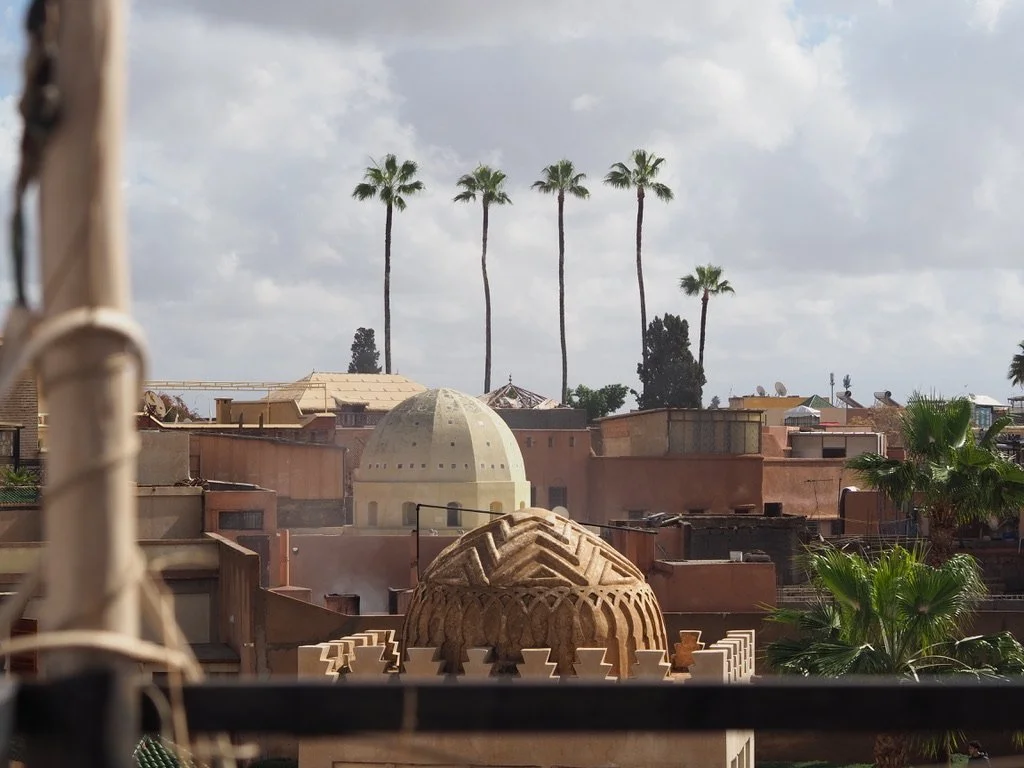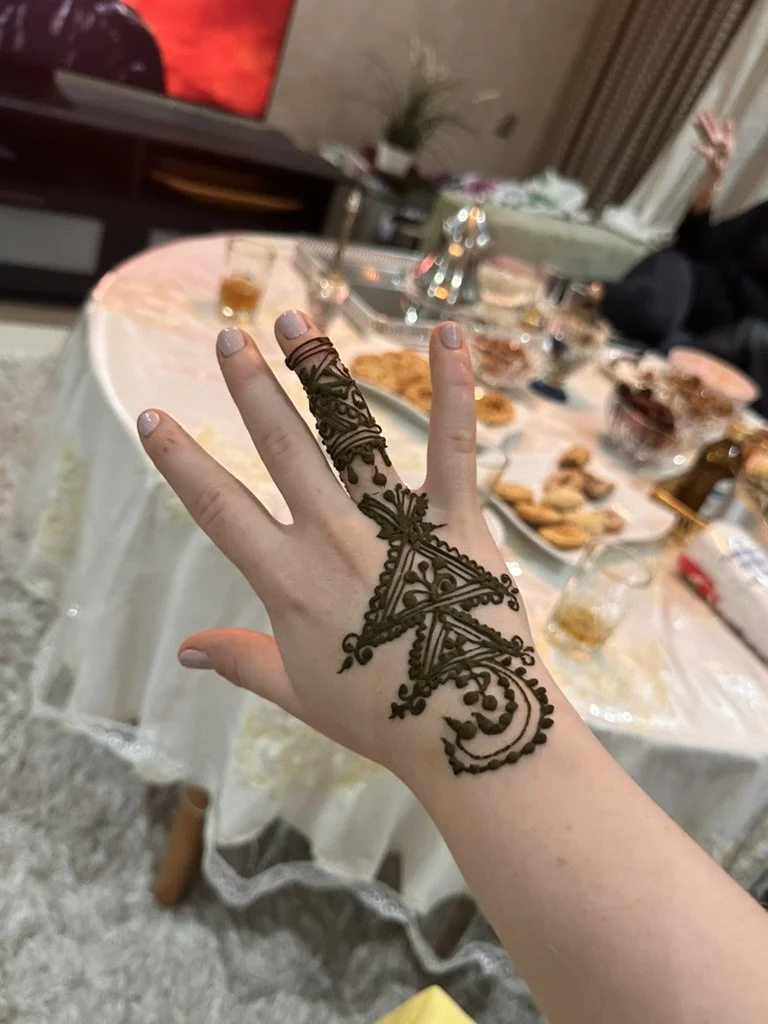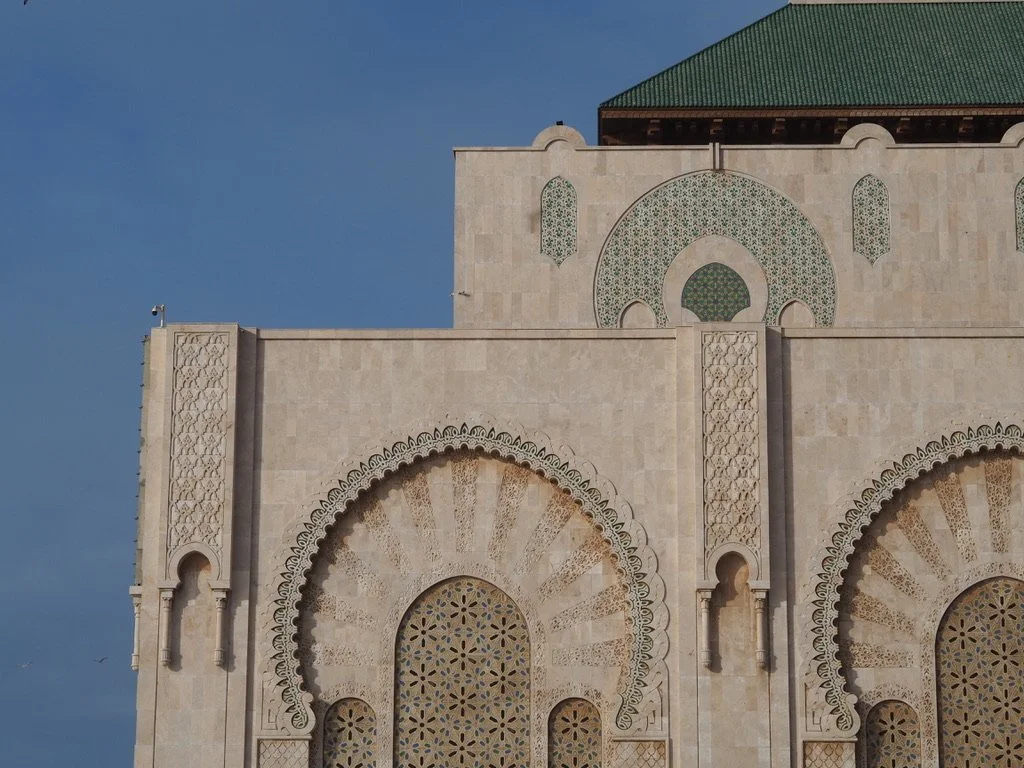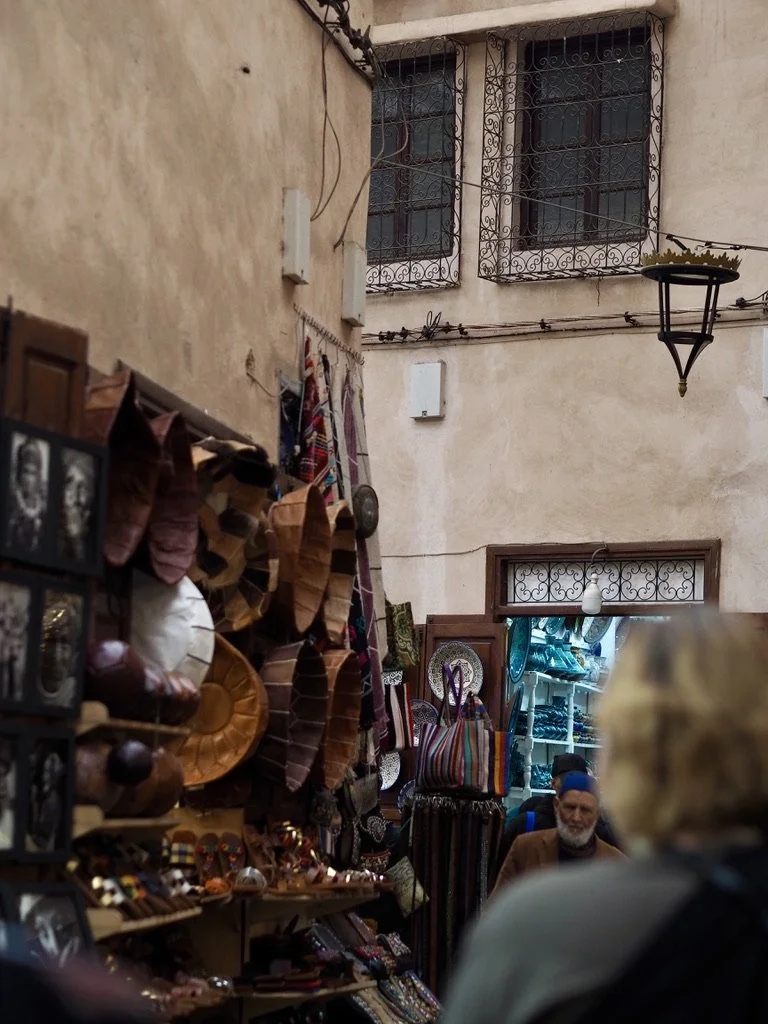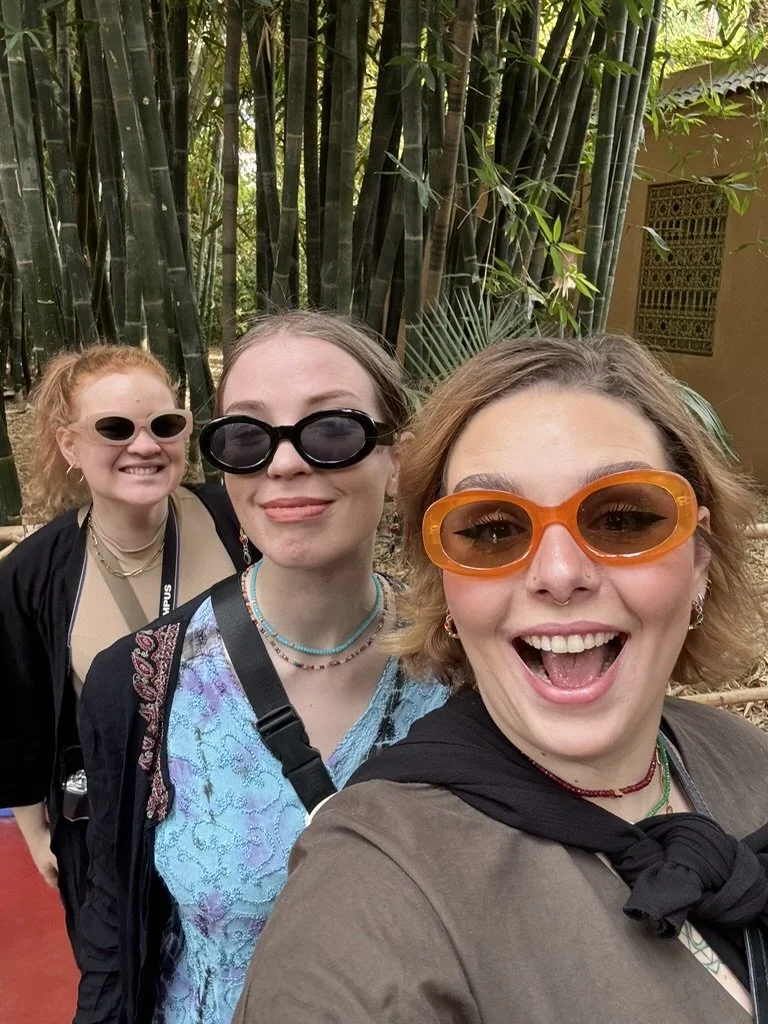Morocco Through Two Pairs of Eyes
View of the rooftops in the Medina, in Marrakesh
Elli: The fierce hospitality of Morroccans became very obvious from the moment I arrived to Riitta’s family home in Casablanca. We had only just gotten in, and dinner was ready, a huge pot of tajine laid out on the table. Next to it, a pot of homemade chilli paste, accompanied by a warning that it is very spicy and I should only take a chouïa, a little bit. I can handle my spice, but holy shit, that must have been one of the spiciest things I’ve ever had. But here comes the cherry (or chilli?) on top of Moroccan hospitality: at the very end of our trip, Riitta’s grandmother insisted on giving me this very jar of chili paste as I had once mentioned that my boyfriend would love it, as well as about a kilo of olives, because I had once mentioned how I loved them. I came with some small gifts to thank the family for hosting me, but I left with more than I came with, in addition to the hospitality I got to experience throughout the trip. Explain me that.
Riitta: Coming to Morocco is coming home. From the moment I see the terrain from the airplane, to standing in line at the border check, to taking my first breath outside, I know I have come home. The color palette, the palm trees starting from the airport all the way to the city, the absolute madness of traffic and constant choir (although not so symphonic) of car and scooter horns roaring in the strees, the smell of gasoline mixed with musk, spices and silver (yes, it has a smell) all make me feel at ease. I’ve been coming to Morocco since I was small: my parents would send me to Casablanca for three months every summer on my own, so I’ve had time to get used to the world full of contrasts where I grew up. Objectively speaking, it is contrasting, yes, but back when I was younger, it didn’t have such a radical hue. It’s a little different now.
Coming from an intensely individualistic country (Finland) to this collectivistic global capital of hospitality can be… intense. I understand Elli: it can be heartwarming, intense and uncomfortable all at the same time. Back in Finland, we try to make as little noise as possible and be as little of a bother to others as we can, whereas in Morocco, being a ‘bother’ is required. You are expected to accept all drinks, foods, compliments, gifts and such that come your way, regardless of how you feel about them. Because at the end of the day, while it is done to make you feel welcome and appreciated, you are gifted a story, an experience.
To give you an example: the jar of chilli paste (I’m all about the spice, my friends, but when I tell you this thing do be spicy as hell… they should have it on ‘Hot Ones’ as a punishment spice). My grandma handmakes the paste. She goes to the nearby market where fresh produce, veggies, herbs and spices are sold and hand-picks the peppers. My grandma is an older woman and no longer drives in the madness that is the streets of Morocco, so she walks uphill to the market. She’s a strong, independent woman, so she also returns on her own, carrying bags and bags of fresh goodies back, one of those bags being the chilis. When she’s back home, she has some lunch before she gets into making the devil spice. That day it might be fresh sardines on the grill with a drizzle of lemon and salt, a tomato and eggplant dish Zaalouk (this stuff is banging), some homemade french fries and a huge jug of cold water. Lunch does not end here, lunch continues in the living room with the family that also came to granny’s place for lunch and consists of sweet mint tea, Moroccan pastries and the sweetest ingredient of all… juicy gossip. And then, it’s siesta time.
After the energies are replenished, it’s time to attack those chilis. Granny is in full let’s-make-hella-hot-chilli-paste mode and works on it for hours. From carefully washing each one, cutting them, mashing them, mixing with oil and jarring them. Now she has enough chilli for the whole family, and extended family and friends of family who are also family and their friends who are also family… Chilli for everyoooone! So the moment Elli entered our house, she was family. And gifting Elli that jar of chilli was gifting her the whole experience of making it: the family gossip she heard that day, the sweet dreams she had during that siesta, the oily crunch of the warm french fries and the sticky chilli residue on her fingers. That’s what Elli got, a burning experience enwrapped in warmth, family and togetherness.
Memories from Morocco also include a series of spa, hair and nail appointments, as well as a henna session among the women of the family around a table always full of sweets and mint tea, an initiation to Moroccan and Berber tradition seamlessly blending with contemporary Arabic music in the background
E: Hosting was a whole family affair: one aunt would take us to a spa or drive us to the airport, another one would have us over for tea and walk with us to the Hassan II Mosque, we were hosted by grandparents and aunts in both Casablanca and Marrakesh, and there was always an abundance of food waiting for us.
The closeness of family is something I really got the opportunity to experience from a perspective very different to mine. Family members see each other weekly if not daily, and when they are not in the same place, they call each other several times a day. The exchange is constant, which understandably results in a strong sense of loyalty and a tightly woven support system - but also its dose of drama. I discovered that for better and for worse, family is really in a central place in Moroccan culture, and it made me reflect on my relationship to family, which, at least on the surface, is much more distant in comparison.
Details of the Hassan II Mosque
From Casablanca, we took a train to Marrakesh, crossing a somewhat surreal landscape formed by red and orange sandy hills, beyond which I imagine the Atlas mountains, and even further out, the Sahara desert that has always fascinated me.
The contrast between a very local and more conservative Casablanca and the vibrant and modern Marrakesh was striking. It seems that while Morocco overall is bound by a fairly traditional Muslim culture, Marrakesh is a place where Moroccans and tourists alike flow for some sort of escape, a place with fewer rules, where bars, sushi restaurants, and casinos alike thrive.
However, when stepping into the old town or medina, you discover a completely different side of Marrakesh, away from the modern buildings, shopping malls and hedonist craze. Walking around the historical buildings, some of which date from almost a thousand years ago, I could visualise a glimpse of places that the tales of One Thousand and One Nights might have been written about. The immense Jemaa el-Fnaa souk offers a place to quite literally get lost between hundreds of stalls and shouting vendors, but how different is it really from what the market might have looked over the centuries? Apart from souvenirs aimed at tourists, a big part of the market was dedicated to textiles, herbs, foods of all sorts, cosmetics, and household items, which I imagine to transcend centuries of commerce in one form or another.
R: Ah, yes, Marrakesh. The destination of so many obsessions, folklore tales and Arabic expectations. When people think of Morocco, they often think of Marrakesh. And for a good reason. It’s a beautiful city, albeit hella hot because it’s not at the coast. It’s also more modern than many other cities in Morocco (not counting Rabat, the city of the King, but that’s a story for another time). You make money elsewhere, but you come to spend it lavishly in Marrakesh. Mind you, it was not always like that.
Getting lost in the endless maze of Jemaa el-Fnaa
I had not been to Morocco for 8 years before this trip, and the place that changed the most was Marrakesh. With the sudden boom of tourism, the city adapted really fast. One of my favourite places in the whole country is the Jemaa el-Fnaa souk. We’d go there every time we visited Morocco, sometimes spending days at the souk. In my head, it’s a mix of golden chandeliers, towers of spice, the smell of leather and African wood, sellers shouting at you (or each other? you never know). Music and dancing. Little stops for mint tea and sweets. The dazzling and overwhelming amount of different colours that filled the small streets that I kept seeing in my dreams ever since. It really was, for better or for worse, a tale of magic. Now, don’t get me wrong, it was not very safe at the time and the pickpockets would be roaming the narrow streets looking for their next prey. And hey, if you take one too many wrong turns, will you get out or will you forever become a part of the maze? Who knows…
But coming back to Marrakesh and specifically Jamaa El-Fnaa after all these years was almost shocking. It still looked the same, more or less, but it was so… fancy. It has always been chic and even posh in some areas, but I felt like the size and frequency of those areas increased exponentially. It was hotel after hotel, on riad, on bar, on casino. It was overwhelming in a different way. The sheer amount of tourists in the streets made so much sense of why it had changed so much: it no longer targets the wealthy of the East, but those of the West.
We walked in the souk, and its products and services were curated for the taste of Westerners. I felt like a vital piece of authenticity was lost in the process. Sellers shouting in all languages known to men from one end of the street to the other in the hopes of attracting flocks of that-specific-language-speaking tourists. The intensity with which vendors try to get you into their stall has increased by at least 40%. While it was always an essential part of souks in Morocco, in general, you go, you talk, you haggle, haggle some more, walk away, come back and then you haggle one more time before you buy, This felt… different.
Don’t let me discourage you: Marrakesh and the souk are places worth the visit. I’m just being slightly melodramatic and nostalgic thinking of the ‘good old days’, but these are the good new days. The economy is thriving, foreign investments are on the rise and tourist bring tons of money = the quality of life for locals increases in the progress. I am just wondering about a painful yet very relevant paradox that applies to so many places in the world. These exceptional and special destinations that drive tourism and experience a rightful boom of interest because of those magnificent and travel-worthy attributes and you want them/us to experience these things. But where does the line go, when a place loses its authenticity and becomes a fars of tourists that any local will avoid like the plague? Thoughts, considerations but no anwsers.
E: Besides days spent wandering around the busy streets and nights in the Marrakesh night life, one of my favourite moments must have been a breakfast in a local cafe. Sitting in the shade with a spread of Beghrir (Moroccan semolina pancakes), a colourful selection of toppings and a coffee was, in its simplicity, engraved into my memory as one of those moments in life where you are exactly where you should be in that specific moment, a peculiar combination of familiarity and novelty.
In these ways and many others, Morocco was to me a fascinating blend of tradition and modernity, of the grandeur of both the past and the present, and a display that it is possible, if not to fully reconciliate, then at least for both to coexist, despite the contradictions that they inevitably bring. It is quite a beautiful reflection of human nature to me, as a constant struggle of contradicting elements that yet we accept and embrace the complexity of to make navigating it a whole part of our existence.
R: Yeah, what she said.
Our crazy little travel committee at the Jardin Majorelle
